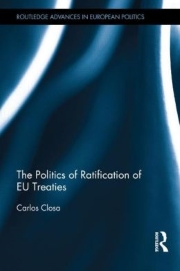 Since its inception, the European Union has revised its foundational treaties several times, resulting in national ratification processes involving different actors, with varying success. This book focuses on the politics of ratification of EU Treaties and reviews the processes of ratification of EU primary legislation.
Since its inception, the European Union has revised its foundational treaties several times, resulting in national ratification processes involving different actors, with varying success. This book focuses on the politics of ratification of EU Treaties and reviews the processes of ratification of EU primary legislation.
Existing research and academic debate on EU constitutional politics have almost exclusively focussed on negotiation of new treaties and their institutional setting. However, this book explains how the result of ratification was achieved, and analyses the strategy that actors pursue across Europe.
Ratification of the Treaty of Maastricht and the EU Constitution failed totally, whilst other ratification can be considered partial failures such as the Irish Nice and Lisbon referendums. As the EU Constitution has proved, the ratification process may have deep effects unforeseen during the processes of negotiation. In recent years, ratification has produced some of the most intense debates on national membership of the EU and the EU itself.
Full info:
The Politics of Ratification of EU Treaties
Carlos Closa, Routledge, 2013